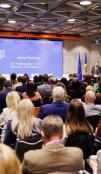Opening remarks by EU High Representative for Foreign Affairs and Security Policy, Kaja Kallas at the European Humanitarian Forum
Dear Ministers,
Dear colleagues,
Dear friends,
The world today is unstable, uncertain and cruel;
Man’s inhumanity to man is there for all to see.
People are going hungry when there is plenty of food to go around. This is the greatest paradox of our time.
The UN has rightly called for a humanitarian reset.
This is an opportunity for the EU to show that we are a partner the world can rely on.
Four points.
First, a promise to you – and one I know I share with Hadja – I will use every diplomatic channel to mobilise political pressure in response to humanitarian needs;
and to ensure that humanitarian principles – humanity, impartiality, neutrality and independence – are respected.
The situation in Gaza, for example, is truly abhorrent.
The response to fears of aid being weaponised cannot be to block it, but to flood Gaza with humanitarian aid, as much as we can, to help those in need.
I have conveyed this message at every opportunity, including at yesterday’s summit with the UK, where it was clear we are aligned on this. And including with all the calls I’ve had with the Israeli Government.
Humanitarian crises are rarely accidental. They are often the result of political failure, the erosion of basic norms, or impunity.
This is why accountability for breaking international and humanitarian law is fundamental. This is my second point.
And why last month, together with the Council of Europe, we established a Special Tribunal for the crime of aggression against Ukraine.
The same principle applies the world over. Would-be perpetrators must know they face consequences.
My third point is that solidarity is innate to who we are as human beings. Humanitarian work should be a global effort.
Over 90 percent of European citizens consider it important the EU funds humanitarian aid.
The European Union and our Member States collectively make the largest contribution to the UN system. We pay on time and we pay in full.
But the decline in U.S. support – given how much the system has lost – calls for a global rethink about new ways to act.
That is why at the Seville conference next month, the EU will be pushing for:
- more private sector involvement;
- a reassessment of how multilateral development banks' operate;
- and for others – China, the Gulf States, India and South Africa for example – to do much more.
Peace and prosperity aren’t built through transactions, power plays or a view of international relations as a zero sum game.
They are built on the idea that if we live in a more secure and stable world, then every one of us will benefit.
That is why, when it comes to humanitarian work, the European Union will never change its tune.
But the EU has got to be smarter about what we do. This is my fourth point.
We have to leverage what we have for the reforms we want to see, including in the United Nations.
And we have to tackle communication issues around humanitarian aid. Information manipulation and misinformation about humanitarian work and access, for example:
- distorts reality;
- sows division within communities;
- and weakens our capacity to manage crises effectively.
We have to actively fight it.
Dear Ministers,
Dear colleagues,
Dear friends,
If humanitarian crises are the result of political failures, impunity, and the erosion of basic norms, we respond with political strength, we fight impunity and we champion humanitarian values.
We do not let food sit in warehouses to rot.
Yes, the European Union must be bolder and smarter in our work.
But we stand by our partners.
We don’t walk away.
Because the European Union will always be a force for good.
Thank you.




